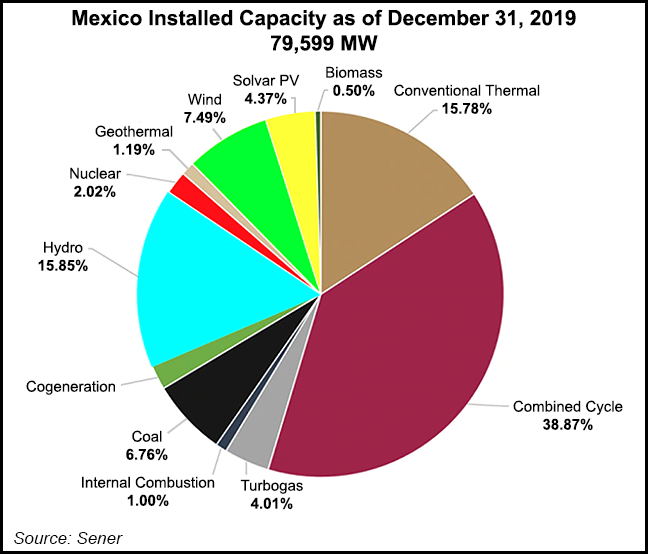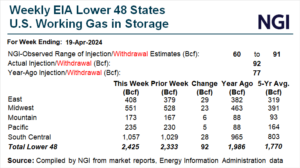Regulatory | Mexico | NGI All News Access | NGI The Weekly Gas Market Report
Mexico Competition Watchdog Seeks Supreme Court Intervention Against New Power Sector Rules

Mexico’s Comisión Federal de Competencia Económica (COFECE), the federal economic competition commission, has asked the country’s Supreme Court to intervene on constitutional grounds against new power sector rules imposed by energy ministry Sener.
The rules, published through an order in the official gazette on May 15, seek to limit the entry of renewable energy projects into operation by suspending their preoperative tests, under the pretext of ensuring stable power grid operations and continuity of supply amid the coronavirus pandemic.
The unilateral order caused an immediate uproar among energy sector stakeholders, which argue that the policy unfairly benefits state power utility Comisión Federal de Electricidad (CFE), and violates the contracts awarded to renewable project developers under Mexico’s 2013-2014 constitutional energy reform.
In addition to preventing the operation of renewable energy plants, the policy allows for the designation of “must-run” power plants in certain regions of the country, widely interpreted as a maneuver to ensure that existing CFE plants are given priority in the dispatch order even if other generators are more economically efficient.
COFECE said Monday the Sener order contradicts the fundamental free market and competition principles enshrined in the constitution.
Two lower courts have granted injunctions against the order, in a positive sign for renewable project sponsors.
Canada’s ambassador to Mexico, along with representatives from the European Union, have expressed their concerns about the policy to Energy Minister Rocio Nahle in writing. The American Petroleum Institute (API) also has voiced concerns in recent days that policies in Mexico designed to favor CFE and Pemex violate the U.S.-Mexico-Canada-Agreement, aka USMCA.
The latest Sener policy “undermines the fundamental principles of competition and free market access ordered” in Mexico’s constitution, and is beyond the scope of Sener’s authority, COFECE said Monday.
The order “severely affects the economic structure of the electricity sector, as it eliminates any possibility for its operation in conditions of competition and efficiency, as well as under the terms set forth in the current national regulatory framework for this sector,” the watchdog said.
“Hence, the contested policy compromises both the open and nondiscriminatory access to transmission and distribution networks…as well as the economic dispatch criterion that governs the operation of the wholesale electricity market; furthermore, it grants advantages in favor of certain participants while reducing the ability of others to compete, forfeits efficiency and establishes barriers to entry in electricity generation.”
The order “was issued under the justification of implementing measures as a response to the drop in electricity consumption caused by Covid-2019,” law firm Holland & Knight said earlier this month.
“However, the document does not specify the reasons why said drop in consumption generates instability” in the national electric system, “the relationship of the proposed measures with Covid-19, nor the criteria or parameters under which the measures were established.”
President Andrés Manuel López Obrador and CFE general director Manuel Bartlett Díaz have criticized the energy reform, which expanded the private sector’s role in the formerly state-dominated energy sector. Both men have argued that the reform was detrimental to CFE and state oil company Petróleos Mexicanos (Pemex).
In a high-profile dispute with several natural gas pipeline developers, Bartlett ordered the renegotiation of natural gas transport contracts that he said were unfair to CFE.
The parties were able to agree on amended contract terms, preventing international arbitration and allowing the 2.6 Bcf/d Sur de Texas-Tuxpan pipeline to begin commercial operation.
Amid the unease about López Obrador’s state-first energy policies, one relative bright spot for free market proponents under the current government has been the management of national pipeline grid operator Centro Nacional de Control del Gas Natural (Cenagas), according to Gadex consultancy founder Eduardo Prud’homme.
© 2024 Natural Gas Intelligence. All rights reserved.
ISSN © 2577-9877 | ISSN © 2577-9966 | ISSN © 1532-1266 |


